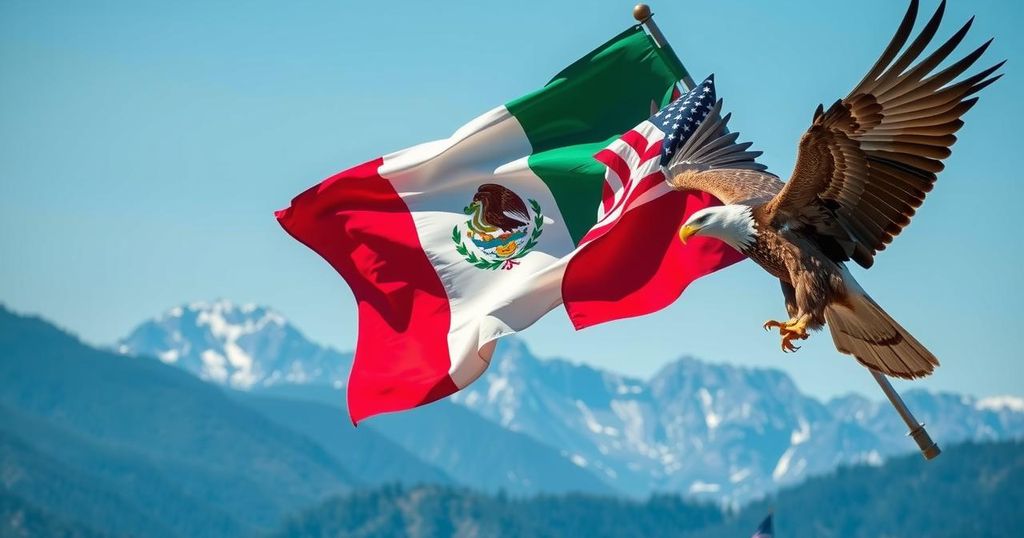Mexican President Rejects Trump’s Military Offer to Fight Drug Cartels

Mexican President Claudia Sheinbaum declined U.S. military assistance from President Trump to combat drug cartels, emphasizing sovereignty. Collaborative efforts on border security are ongoing, but Sheinbaum firmly rejected U.S. forces on Mexican soil. The Heritage Foundation suggested military use should be a last resort in addressing cartel activities.
Mexican President Claudia Sheinbaum has officially refused President Donald Trump’s offer for U.S. military assistance aimed at combating drug cartels. In an interview addressing a report by the Wall Street Journal, Sheinbaum simply stated, “it’s true” that she rejected the proposal. Trump reached out to her, inquiring, “How can we help you fight drug trafficking?” to which Sheinbaum responded firmly, asserting that Mexico would “never accept” the presence of U.S. troops on Mexican soil.
During the dialogue, Sheinbaum elaborated that Mexico values its sovereignty, saying, “No, President Trump, our territory is inalienable, sovereignty is inalienable.” She emphasized a collaborative approach without direct U.S. military involvement, proposing instead to share information while keeping military activities separated by national borders.
A written statement from White House Deputy Press Secretary Anna Kelly pointed toward ongoing joint efforts with Mexico to enhance border security. She noted, “President Trump has worked with President Sheinbaum to advance border security collaboration with Mexico to the highest levels ever.” Kelly highlighted the tangible outcomes from this cooperation, including the transfer of several cartel leaders to the U.S. for prosecution.
In support of these measures, the Trump administration has utilized CIA drones for surveillance in Mexico, along with naming drug cartels as “foreign terrorist” organizations. However, Kelly emphasized that Mexico must increase its efforts to combat the violence and drug smuggling that impact both countries significantly. The administration remains open to exploring additional strategies for dealing with these transnational criminal groups.
Earlier this year, the Heritage Foundation, a prominent conservative organization, released a report that discussed how Trump could potentially use the military to tackle the border crisis. The analysis mentioned that Mexican cartels are expanding their influence, with increasing illegal immigration and drug trafficking rates. The report advised that direct military action against cartels should be a last resort, recommending instead collaborative military efforts with Mexican officials.
The foundation expressed skepticism about changes in Mexico’s military cooperation stance, particularly with Sheinbaum in charge, despite the escalating threats posed by drug cartels. They noted, “In the appropriate context, unilateral U.S. military action may be employed to disrupt cartel activity and prompt cooperation from a resistant Mexican government.”
This situation remains dynamic, as the complexities of U.S.-Mexico relations continue to unfold against the backdrop of ongoing violence and corruption linked to drug trafficking.
In summary, President Claudia Sheinbaum has decisively rejected President Trump’s offer of U.S. military aid in combating drug trafficking in Mexico, firmly asserting the nation’s sovereignty. There are ongoing collaborative efforts between the two nations to improve border security and combat drug cartels, but Sheinbaum emphasizes that military presence is not an option. Reports discuss potential military strategies, yet highlight the necessity of cooperative approaches rather than unilateral actions which Mexico staunchly opposes at this juncture.
Original Source: www.foxnews.com







